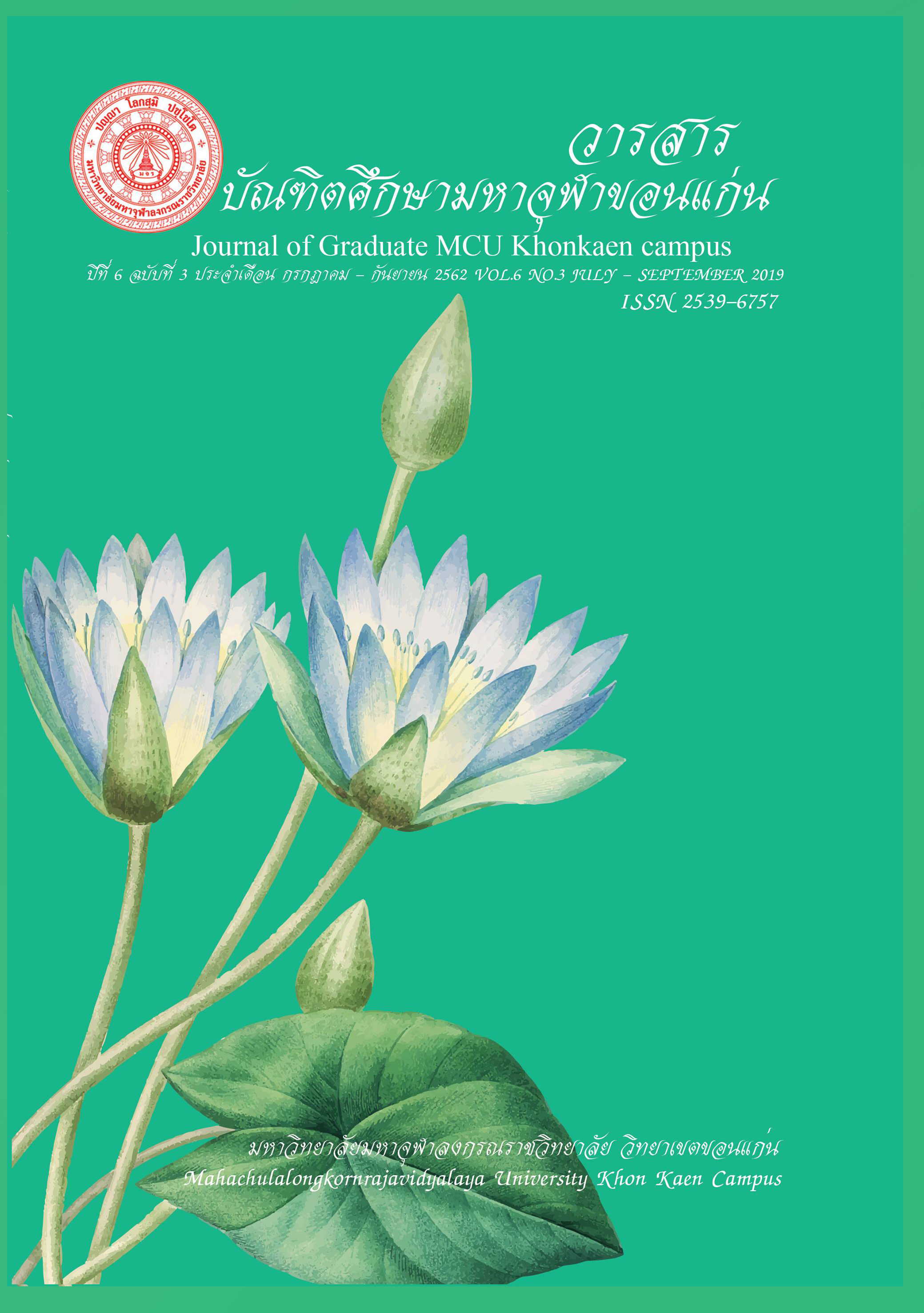รูปแบบการพัฒนาคุณลักษณะอันพึงประสงค์ของอาจารย์ มหาวิทยาลัยมหาจุฬาลงกรณราชวิทยาลัย
Main Article Content
บทคัดย่อ
การวิจัยครั้งนี้มีวัตถุประสงค์ คือ 1) เพื่อศึกษาสภาพคุณลักษณะอันพึงประสงค์ของอาจารย์มหาวิทยาลัยมหาจุฬาลงกรณราชวิทยาลัย 2) เพื่อพัฒนารูปแบบการพัฒนาคุณลักษณะอันพึงประสงค์ของอาจารย์มหาวิทยาลัยมหาจุฬาลงกรณราชวิทยาลัย และ 3) เพื่อเสนอรูปแบบการพัฒนาคุณลักษณะอันพึงประสงค์ของอาจารย์มหาวิทยาลัยมหาจุฬาลงกรณราชวิทยาลัย เป็นรูปแบบผสมวิธี คือ 1) การวิจัยเชิงปริมาณ ใช้แบบสอบถามความคิดเห็นกลุ่มตัวอย่าง จำนวน 165 รูป/คน ทำการวิเคราะห์ข้อมูลด้วยสถิติ ได้แก่ ค่าเฉลี่ย และส่วนเบี่ยงเบนมาตรฐาน และ 2) การวิจัยเชิงคุณภาพ ประกอบด้วยการสัมภาษณ์ผู้ทรงคุณวุฒิ จำนวน 7 รูป/คน เพื่อใช้องค์ความรู้ดังกล่าวมาพัฒนาเป็นรูปแบบ และการจัดสนทนากลุ่มผู้ทรงคุณวุฒิ จำนวน 9 รูป/คน เพื่อการตรวจสอบความเหมาะสมของรูปแบบ ทำการวิเคราะห์ข้อมูลด้วยการวิเคราะห์เนื้อหา
ผลการวิจัยพบว่า
- สภาพคุณลักษณะอันพึงประสงค์ของอาจารย์มหาวิทยาลัยมหาจุฬาลงกรณราชวิทยาลัย ในภาพรวมอยู่ในระดับมาก ในรายด้านอยู่ในระดับมากทุกด้าน คือ คุณธรรมและจริยธรรม ความสามารถในการสอน บุคลิกภาพ และการให้คำปรึกษากับนิสิต
- รูปแบบการพัฒนาคุณลักษณะอันพึงประสงค์ของอาจารย์มหาวิทยาลัยมหาจุฬาลงกรณราชวิทยาลัย ประกอบด้วย 1) คุณลักษณะอันพึงประสงค์ของอาจารย์ คือ ความสามารถในการสอน บุคลิกภาพ คุณธรรมจริยธรรม การให้คำปรึกษา 2) มาตรฐานวิชาชีพครูคือ ค่านิยมและคุณลักษณะความเป็นครู ความรู้และศาสตร์การสอน การปฏิบัติงานในหน้าที่ ความสัมพันธ์กับผู้ปกครองและชุมชน 3) กระบวนการพัฒนา (1) การพัฒนา ประกอบด้วย การพัฒนาความสามารถในการสอน โดยสร้างหลักสูตร ฝึกอบรม การพัฒนาบุคลิกภาพ โดยสร้างโครงการพัฒนาอบรม การคุณธรรมจริยธรรม โดยออกข้อบังคับระเบียบหรือประกาศ ฝึกอบรม การพัฒนาการให้คำปรึกษากับนิสิต โดยสร้างหลักสูตรหรือสร้างโครงการ อบรมพัฒนาขบวนการ (2) คุณลักษณะอันพึงประสงค์ของอาจารย์ประกอบด้วย ความสามารถในการสอน ลักษณะของอาจารย์ยุคศตวรรษที่ 21 ต้องมีเรียกว่า E-Teacher บุคลิกภาพ บุคลิกภาพที่ดีของอาจารย์ที่ดี คุณธรรมจริยธรรม การประเมินคุณธรรมและจริยธรรมของครูอาจารย์ผู้ที่เป็นบุคลากรทางการศึกษา การให้คำปรึกษากับนิสิต ครูอาจารย์สามารถเป็นได้ทั้งผู้สอนผู้เรียนรู้และผู้ให้คำปรึกษาได้ทุกแนวทางแก่ผู้เรียน (3) หลักธรรมที่ใช้ในการพัฒนาคุณลักษณะอันพึงประสงค์ของอาจารย์ประกอบด้วย ความสามารถในการสอน คือ พุทธลีลาในการสอน 4 บุคลิกภาพ คือ กัลยาณมิตรธรรม 7 คุณธรรมจริยธรรม คือ มัชฌิมาปฏิปทา หรืออริยมรรคมีองค์ 8 การให้คำปรึกษา คือ อริยสัจ 4
- ผู้ทรงคุณวุฒิได้ตรวจสอบรูปแบบการพัฒนาคุณลักษณะอันพึงประสงค์ของอาจารย์มหาวิทยาลัยมหาจุฬาลงกรณราชวิทยาลัยพบว่า มีความเหมาะสมและเป็นไปได้ในการนำไปใช้ในการพัฒนาได้จริง
Article Details
รูปแบบการอ้างอิง
(การเพียร) พ. ส. (2019). รูปแบบการพัฒนาคุณลักษณะอันพึงประสงค์ของอาจารย์ มหาวิทยาลัยมหาจุฬาลงกรณราชวิทยาลัย. วารสารบัณฑิตศึกษามหาจุฬาขอนแก่น, 6(3), 320–336. สืบค้น จาก https://so02.tci-thaijo.org/index.php/jg-mcukk/article/view/215592
ประเภทบทความ
บทความวิจัย
เอกสารอ้างอิง
1. ภาษาไทย
ก. ข้อมูลปฐมภูมิ
มหาจุฬาลงกรณราชวิทยาลัย. พระไตรปิฎกภาษาไทยฉบับมหาจุฬาลงกรณราชวิทยาลัย, กรุงเทพมหานคร : มหาจุฬาลงกรณราชวิทยาลัย,2539.
ข. ข้อมูลทุติยภูมิ
(1) หนังสือ :
กรมวิชาการ. แนวทางการจัดทำแผนพัฒนาคุณภาพการศึกษาของสถานศึกษา.พิมพ์ครั้งที่ 2. กรุงเทพมหานคร: สำนักทดสอบทางการศึกษา, 2545.
กรมสามัญศึกษา. พระราชบัญญัติการศึกษาแห่งชาติ พุทธศักราช 2542 และการวิเคราะห์สาระสำคัญ. กรุงเทพมหานคร: โรงพิมพ์คุรุสภา, 2542.
กลุ่มงานบริหารงานบุคคล กองกลาง สำนักงานอธิการบดี. เอกสารประกอบแนวการสอบคัดเลือกเป็นบุคลากรของมหาวิทยาลัย มหาจุฬาลงกรณราชวิทยาลัย. กรุงเทพฯ: มหาจุฬาลงกรณราชวิทยาลัย. 2560.
บุญชม ศรีสะอาด. การวิจัยเบื้องต้น. พิมพ์ครั้งที่ 7. กรุงเทพฯ: สำนักพิมพ์สุวีริยาสาส์น. 2555.
สำนักงานคณะกรรมการการอุดมศึกษา. กรอบแผนอุดมศึกษา ระยะยาว 15 ปี ฉบับที่ 2 (พ.ศ.2551-2565). กรุงเทพมหานคร: สำนักงานคณะกรรมการการอุดมศึกษา, 2550.
สำนักงานเลขาธิการสภาการศึกษา. การปฏิรูปการศึกษาในทศวรรษที่สอง (2552-2561). กรุงเทพมหานคร: กระทรวงศึกษาธิการ. 2552.
(3) วิทยานิพนธ์/งานวิจัย :
ณรงค์ฤทธิ์ ประสานตรี. “รูปแบบการพัฒนาอาจารย์มหาวิทยาลัยราชภัฏกลุ่มรัตนโกสินทร์”. ปริญญาปรัชญาดุษฎีบัณฑิต สาขาวิชาการพัฒนาทรัพยากรมนุษย์คณะการพัฒนาทรัพยากรมนุษย์. มหาวิทยาลัยรามคำแหง. 2558.
ประมูล สารพันธ์. “การศึกษาสภาพการศึกษาของมหาวิทยาลัยสงฆ์ในกำกับของรัฐบาล: ศึกษาเฉพาะกรณีมหาวิทยาลัยมหาจุฬาลงกรณราชวิทยาลัย”. รายงานการวิจัย. กรุงเทพมหานคร : โรงพิมพ์มหาจุฬาลงกรณราชวิทยาลัย, 2544.
สาคร ธระที. “แนวโน้มในการบริหารจัดการของมหาวิทยาลัยมหาจุฬาลงกรณราชวิทยาลัยในทศวรรษหน้า”. รายงานวิจัย. กองวิเทศสัมพันธ์ : มหาวิทยาลัยมหาจุฬาลงกรณราชวิทยาลัย, 2554.
Ashworth, Allan and Harvey, Roger C. “Assessing Quality in Further and Higher Education”. London: Jessica Kingsley Publishers, 1994.
Likert, Rensis, “The Method of Constructing and Attitude Scale”, in Reading in Attitude Theory and Measurement. Fishbeic, Matin. Ed, New York: Wiley & Son, 1967: 90-95.
ก. ข้อมูลปฐมภูมิ
มหาจุฬาลงกรณราชวิทยาลัย. พระไตรปิฎกภาษาไทยฉบับมหาจุฬาลงกรณราชวิทยาลัย, กรุงเทพมหานคร : มหาจุฬาลงกรณราชวิทยาลัย,2539.
ข. ข้อมูลทุติยภูมิ
(1) หนังสือ :
กรมวิชาการ. แนวทางการจัดทำแผนพัฒนาคุณภาพการศึกษาของสถานศึกษา.พิมพ์ครั้งที่ 2. กรุงเทพมหานคร: สำนักทดสอบทางการศึกษา, 2545.
กรมสามัญศึกษา. พระราชบัญญัติการศึกษาแห่งชาติ พุทธศักราช 2542 และการวิเคราะห์สาระสำคัญ. กรุงเทพมหานคร: โรงพิมพ์คุรุสภา, 2542.
กลุ่มงานบริหารงานบุคคล กองกลาง สำนักงานอธิการบดี. เอกสารประกอบแนวการสอบคัดเลือกเป็นบุคลากรของมหาวิทยาลัย มหาจุฬาลงกรณราชวิทยาลัย. กรุงเทพฯ: มหาจุฬาลงกรณราชวิทยาลัย. 2560.
บุญชม ศรีสะอาด. การวิจัยเบื้องต้น. พิมพ์ครั้งที่ 7. กรุงเทพฯ: สำนักพิมพ์สุวีริยาสาส์น. 2555.
สำนักงานคณะกรรมการการอุดมศึกษา. กรอบแผนอุดมศึกษา ระยะยาว 15 ปี ฉบับที่ 2 (พ.ศ.2551-2565). กรุงเทพมหานคร: สำนักงานคณะกรรมการการอุดมศึกษา, 2550.
สำนักงานเลขาธิการสภาการศึกษา. การปฏิรูปการศึกษาในทศวรรษที่สอง (2552-2561). กรุงเทพมหานคร: กระทรวงศึกษาธิการ. 2552.
(3) วิทยานิพนธ์/งานวิจัย :
ณรงค์ฤทธิ์ ประสานตรี. “รูปแบบการพัฒนาอาจารย์มหาวิทยาลัยราชภัฏกลุ่มรัตนโกสินทร์”. ปริญญาปรัชญาดุษฎีบัณฑิต สาขาวิชาการพัฒนาทรัพยากรมนุษย์คณะการพัฒนาทรัพยากรมนุษย์. มหาวิทยาลัยรามคำแหง. 2558.
ประมูล สารพันธ์. “การศึกษาสภาพการศึกษาของมหาวิทยาลัยสงฆ์ในกำกับของรัฐบาล: ศึกษาเฉพาะกรณีมหาวิทยาลัยมหาจุฬาลงกรณราชวิทยาลัย”. รายงานการวิจัย. กรุงเทพมหานคร : โรงพิมพ์มหาจุฬาลงกรณราชวิทยาลัย, 2544.
สาคร ธระที. “แนวโน้มในการบริหารจัดการของมหาวิทยาลัยมหาจุฬาลงกรณราชวิทยาลัยในทศวรรษหน้า”. รายงานวิจัย. กองวิเทศสัมพันธ์ : มหาวิทยาลัยมหาจุฬาลงกรณราชวิทยาลัย, 2554.
Ashworth, Allan and Harvey, Roger C. “Assessing Quality in Further and Higher Education”. London: Jessica Kingsley Publishers, 1994.
Likert, Rensis, “The Method of Constructing and Attitude Scale”, in Reading in Attitude Theory and Measurement. Fishbeic, Matin. Ed, New York: Wiley & Son, 1967: 90-95.

